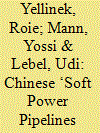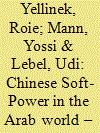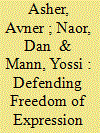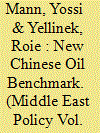|
|
|
Sort Order |
|
|
|
Items / Page
|
|
|
|
|
|
|
| Srl | Item |
| 1 |
ID:
183497


|
|
|
|
|
| Summary/Abstract |
The article examines China’s ‘soft power’ invested in Middle Eastern countries from 2000 to 2018 by offering three main ‘Soft Power Pipelines Diffusion’ (SPPD): the media, popular culture and education. The paper focuses not only on China’s soft presence but also on the response and reception of its power in Middle Eastern Arab countries. China’s soft power presence and efforts were found to be efficient and to contribute to China’s image in the region and to its transformation into an attractive destination for cooperation in many soft areas.
|
|
|
|
|
|
|
|
|
|
|
|
|
|
|
|
| 2 |
ID:
175699


|
|
|
|
|
| Summary/Abstract |
Confucius Institutes are one of the major ways China invests Soft-Power in the world. This paper will examine the Confucius Institutes in universities in Arabic speaking countries from 2006 to 2020. It will focus on the response and reception of China’s Soft-Power in these countries. An initial index for examining the success of these institutes will be offered, which can also be applied to educational-cultural institutes in general. The following review and analysis of data point to the conclusion that Confucius Institutes, as a tool of Chinese Soft-Power, have effectively penetrated the Arab world and are welcomed without significant criticism.
|
|
|
|
|
|
|
|
|
|
|
|
|
|
|
|
| 3 |
ID:
181307


|
|
|
|
|
| Summary/Abstract |
Lebanon is among the most developed Arab countries concerning freedom of expression, and its press and media are famous for their openness and critical approach toward domestic and Arab affairs. The openness and criticism notwithstanding, there are various restrictions, not always formal ones, on the freedom of expression in Lebanon. While much has been written about Lebanese freedom of expression and media, few researches have concentrated on Lebanese political TV satire. This article aims to examine the limits of freedom of expression in Lebanon, as reflected in the various political TV satire shows. The article examined five satire shows: Basmat Watan, La Youmal, Ma Fi Metlo, Chi.N.N. and Awal ‘Ala Akhir. For each show, the article referred to three controversial issues: the attitude toward politics and politicians; the attitude toward Hezbollah and its weapons; and the attitude toward Lebanese presidents, foreign heads of states and Syria. Focusing on the different Lebanese TV satire shows and these contentious subjects reveals how these shows challenge the press and media laws, break taboos and even, to a certain degree, habituate the Lebanese audience to engage with controversial issues.
|
|
|
|
|
|
|
|
|
|
|
|
|
|
|
|
| 4 |
ID:
177520


|
|
|
|
|
| Summary/Abstract |
China introduced a new oil benchmark in March 2018, part of a bid to establish its position as an economic superpower. This article analyzes the impact of this new index on the Middle East, a key region where much of the oil on which the index is based originates, by focusing on market transparency, market determination, government involvement, physical accessibility, and the internal Chinese dialogue. The article then discusses the political, financial, and economic view from the Middle Eastern perspective. It finds that China still has a long way to go before it can turn the new oil benchmark into an international standard. In addition, the Shanghai Stock Exchange was launched just before the escalation of the trade dispute between the world's two largest economies, the United States and China. While this fight could hurt the traditional indices and elevate China's new oil benchmark, the coronavirus, which has spread worldwide from China, is another factor that may affect the quality and impact of this new index.
|
|
|
|
|
|
|
|
|
|
|
|
|
|
|
|
| 5 |
ID:
182033


|
|
|
|
|
| Summary/Abstract |
Oil plays an important role in shaping the political system in the Middle East. The Black Gold’s important role in stabilizing the government, the economy and the social system in the MENA region and especially in significant oil exporting countries such as the Arab Gulf States. In recent years there have been changes in the global oil market that enforced a re-discussion regarding the ability of the oil market to continue to be an important factor in creating stability in the oil countries. The following article seeks to examine the extent to which oil has affected the stability of the oil countries mainly in the Arab Gulf and most of all to try and assess the significance of oil’s decline in status as a major component that drives the economy in countries across the region.
|
|
|
|
|
|
|
|
|
|
|
|
|
|
|
|
|
|
|
|
|